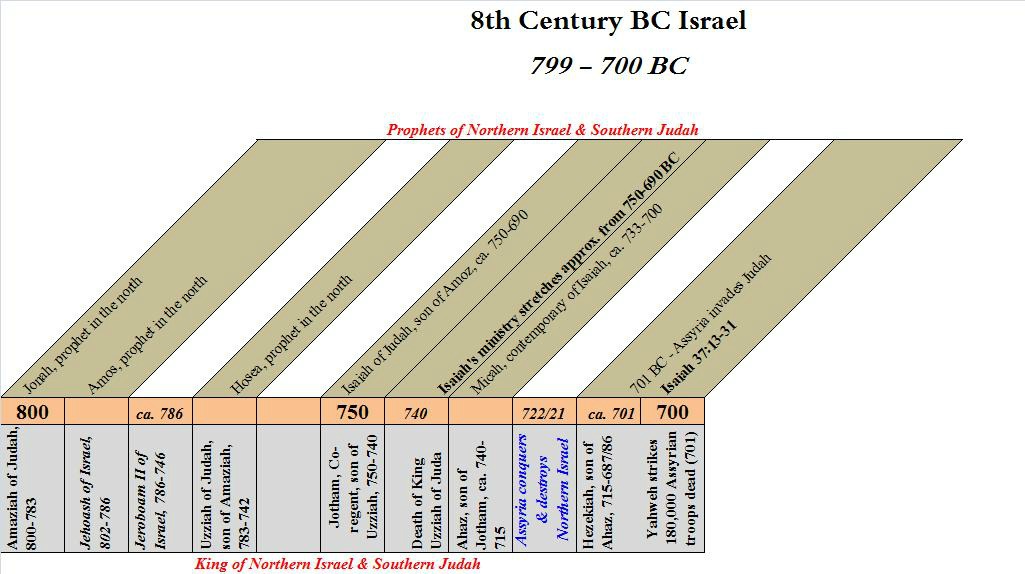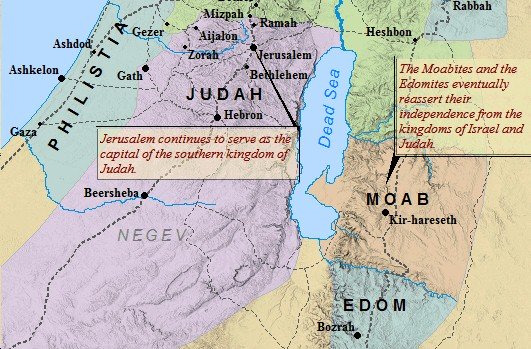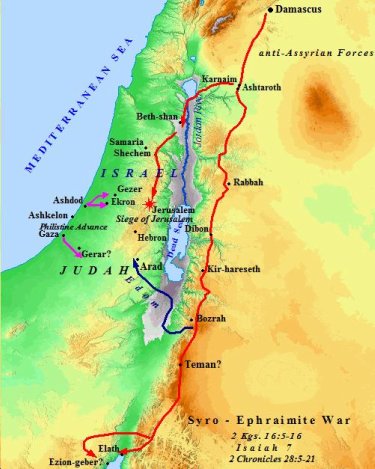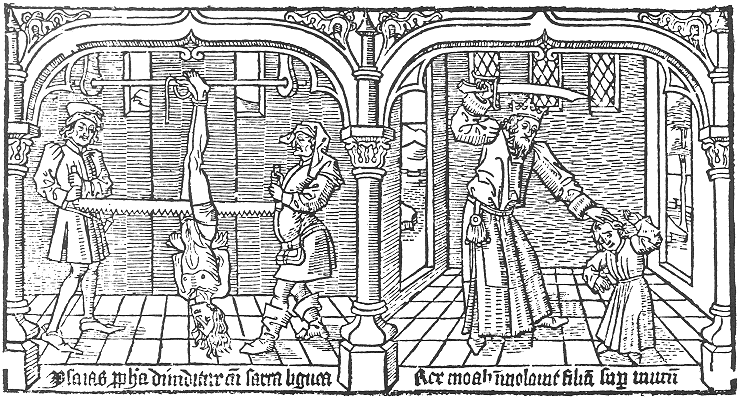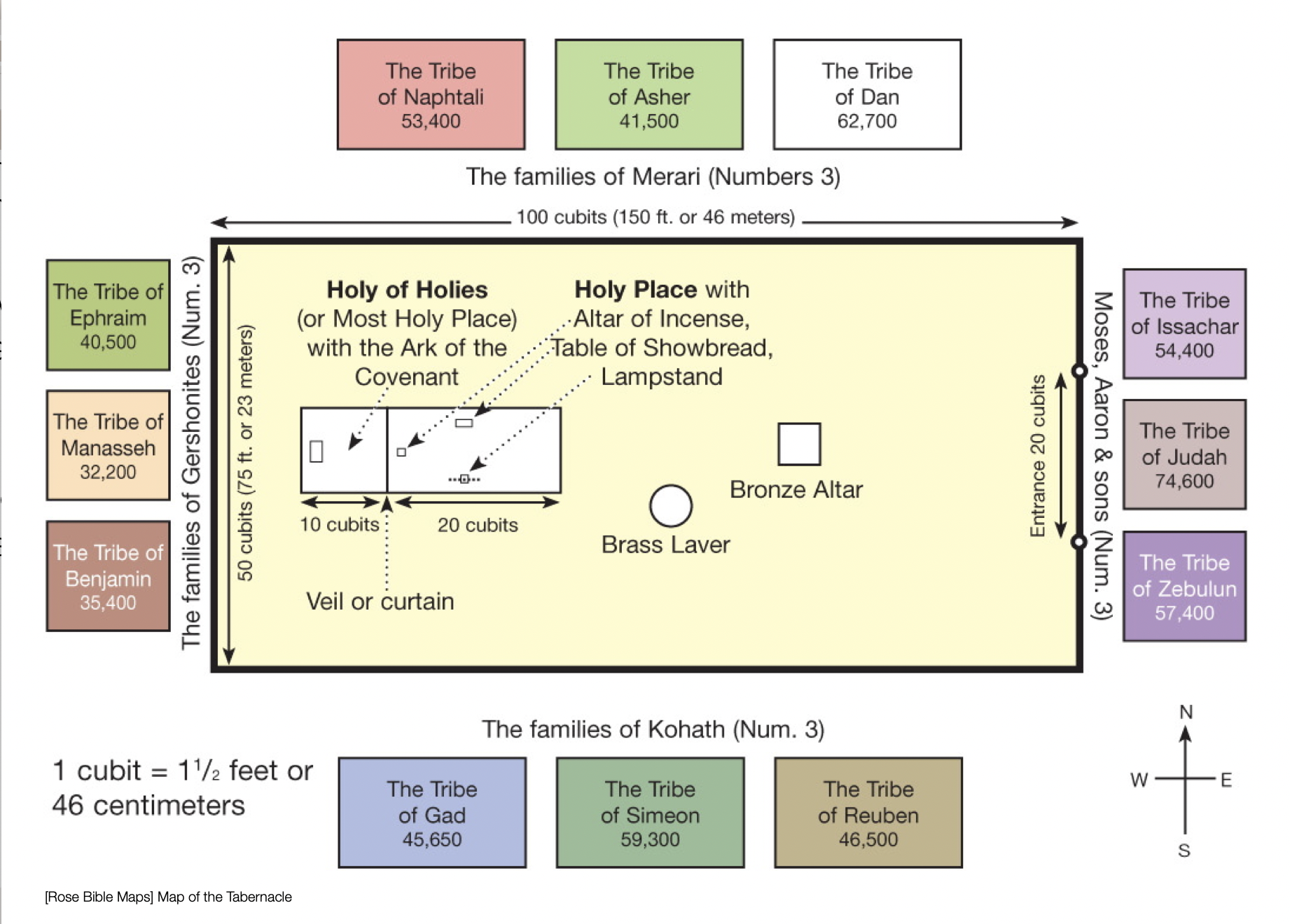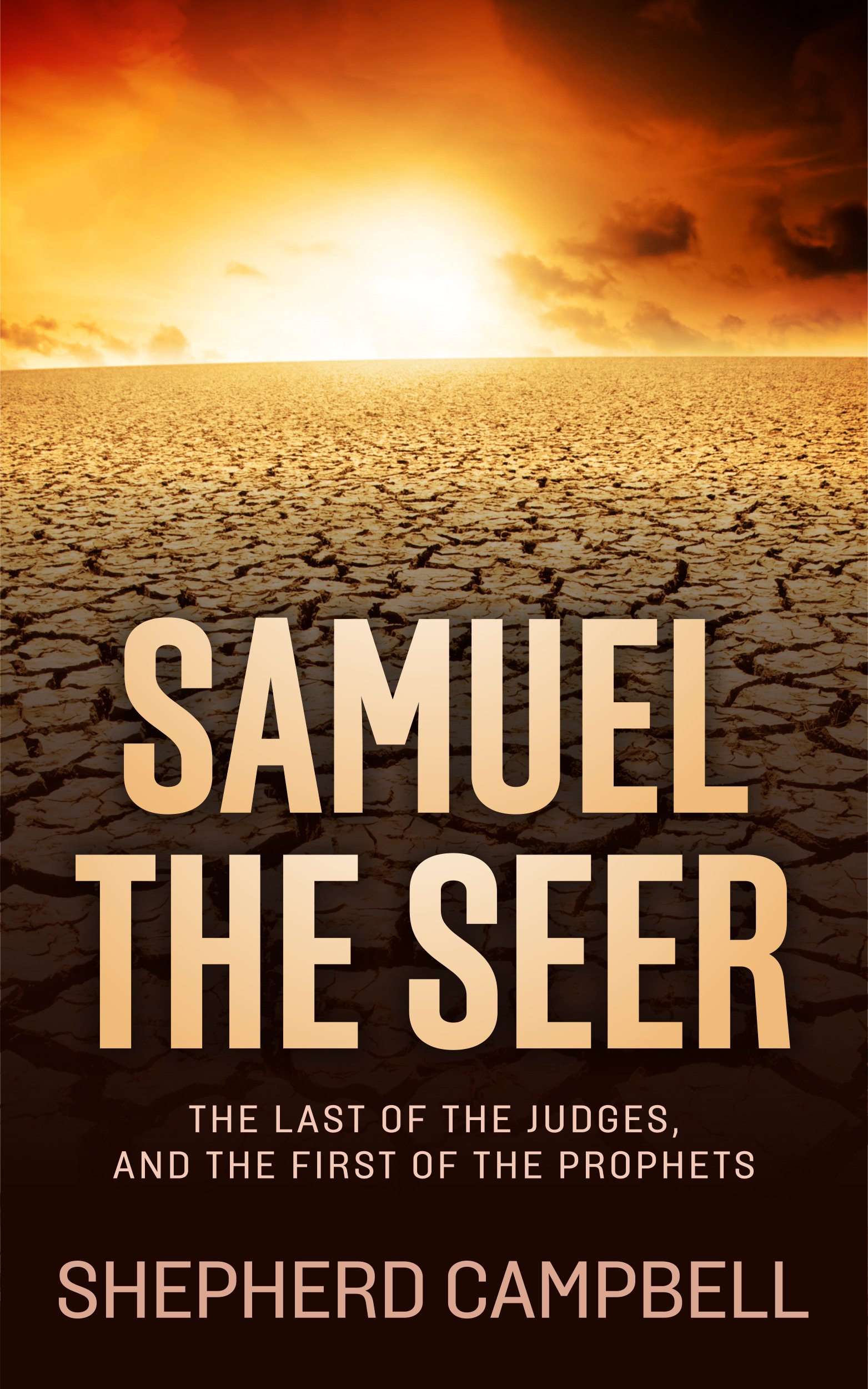VISIT OUR FACEBOOK PAGE!
THE BOOK OF ISAIAH
The book of Isaiah is quoted more times in the New Testament than any other book, prophet or character in the Old Testament - 411 times total. For this reason alone special attention should be paid to this prolific and extremely relevant prophet. Isaiah's ministry (ca. 750 - 690 BC), perhaps more so than anybody else in the OT, connects both the Old and New Testaments together.
The book of Isaiah serves as a bridge connecting the wide gap between the writings of the OT and the formation of the NT. Jesus Himself said He did not come to abolish the old law, but establish a new one and to fulfill the old. Jesus often spoke of the teachings of Isaiah.
This fact is often overlooked. The OT and the NT are viewed by too many as separate books from different times, when in fact, they are two books of the same message - a story continued. Yes, they are from different times, and yes, they do contain different theological truths to some extent, but the message is clearly united.
The book of Isaiah displays this continuity arguably better than any other OT figure or prophet. Isaiah's repeated Messianic themes echo throughout the rest of the Bible into the pages of Revelation. Jesus loved to quote from the book of Isaiah. It is no coincidence the first passage Jesus read in public after His temptation in the wilderness, in His hometown synagogue of Nazareth, was from Isaiah 61 (Luke 4).
In fact, Isaiah's name means, "salvation of YHWH", or, "YHWH saves". Indeed this theme appears frequently in the book of Isaiah, and is a theme which runs throughout the entire Bible. God's saving redemption through Jesus is a major theme of the New Testament. In his name, Isaiah captures one of the chief themes in the Bible - God saves and delivers.
The prophet Isaiah ministered during the middle to end of the 8th century BC. This timeline shows Isaiah's day in context with prophets & kings throughout the 8th century, both in Judah & northern Israel. Isaiah's time stretched from ca. 750 to 690 BC. The book of Isaiah is believed to have been finally compiled ca. 630 BC. This was decades after his death.
THE BOOK OF ISAIAH
ONLINE RESOURCE
The Book of Isaiah - General Information about the book of Isaiah
(Below will be links to a study of each chapter within the book of Isaiah. Chapters will be added to this web page as they are completed. Check back regularly for updates and additions!)
Zodhiates Greek/Hebrew Key Study Bible - NASB
Click to view commentary.
ISAIAH 1 - Rebellion of God's People
ISAIAH 2 - God's Universal Reign
ISAIAH 5 - Parable of the Vineyard
ISAIAH 6 - Isaiah's Vision
ISAIAH 7 - War Against Jerusalem
ISAIAH 9 - Birth & Reign of the Prince of Peace
ISAIAH 24 - The Apocalypse of Isaiah
ISAIAH - The Man & the Prophet
We know little about the actual life of the man Isaiah. The book of Isaiah gives scant detail about him, paying more attention to his prophecies and ministry than to his biography. However, a few clues and tidbits of information are scattered throughout the Scriptures to give us an idea.
Family
Isaiah 1:1 reveals Isaiah is the son of Amoz (not to be confused with the prophet Amos). No brothers or sisters are given, nor is the name of Isaiah's mother. Isaiah 7 - 8, though, gives the names of the prophet's family.
The Bible says Isaiah married a prophetess (8:3), though her name is not given. Gary V. Smith correctly points out we are not told if she was actually a prophetess, as none of her sayings or teachings are in the Bible, or, if this simply meant she married a prophet. In Isaiah 7:3 & 8:3 we are given the names of their two sons.
The first son of Isaiah was named, Shear-Jashub, which meant "a remnant will return". The faithful remnant of God's people is a reoccurring theme in the book of Isaiah. His second son's name was, Maher-Shalal-Hash-Baz, which translates as, "quick to plunder, swift to spoil" (Is. 8:3). This passage can be somewhat confusing, as a third child is mentioned in Isaiah 7:10-16. This child is not Isaiah's; and in fact many argue this is a prophecy of Christ's birth, though this interpretation has its critics.
Thus it is clear Isaiah's family was an important and integral part of his ministry, though little else is ever mentioned of them again. We only know they were faithful to Yahweh as evidenced by their willful and faithful participation in Isaiah's often strange ministry.
Background
Isaiah lived in Judah, most likely in Jerusalem. Many scholars feel he came from a wealthy and, perhaps, royal family. This would explain the ease with which Isaiah often approaches the different Kings of Judah. Some have even felt inclined to support a theory Isaiah was a cousin of King Uzziah (II Chronicles 26:22), and his father Amoz a brother of King Amaziah.
R.T. Anderson suggests this scenario based on a seal discovered in Jerusalem. The seal's inscription reads; "Amoz the scribe". The date of the seal is unknown, and Amoz quite possibly could've been a popular name in ancient Israel, so the accuracy of Anderson's theory based on this seal has been brought into question.
Yet the notion is not without validity. Scripture does seem to indicate Isaiah possessed special access to the king. II Chron. 26:22
does record Isaiah was the sole individual responsible for writing down
the acts of King Uzziah - thus the King's chief scribe. This is quite
different from, say King David, who had Samuel, Nathan and Gad all
record his reign (I Chron. 29:29). King Solomon, too, had multiple seers and prophets record his reign (II Chr. 9:29).
Jewish tradition in the Talmud (Sota 10b) suggests Amoz was the brother of King Amaziah, the father of King Uzziah. Linguists point to the "-iah" ending of Isaiah's name as indicative of royalty. This ending is an abbreviation for YHWH and was practiced in ancient Israel almost exclusively among the royal and elite.
Isaiah
loved Jerusalem, and was quite familiar with life inside the city. He
was well respected among Jerusalem's elite, as he often criticized them
with no repercussion. He was also familiar with the oppressed and poor
of the city. Isaiah was very well acquainted with the Temple and its
procedures and practices (Is. 1:11-15).
|
The Time Period of Isaiah Isaiah is one of the longest books in the Old Testament. Mainly because Isaiah's ministry was one of the longest recorded in the OT - spanning the reigns of 5 kings - Uzziah, Jotham, Ahaz, Hezekiah & Manasseh. We know Isaiah lived in the 8th century BC. He was a part of the 8th century string of prophets including Jonah, Amos, Hosea and Micah. The former three were prophets in the northern kingdom of Israel. Micah was a contemporary of Isaiah's, and also of the southern kingdom of Judah. |
CERTAIN EVENTS WITHIN THE BOOK OF ISAIAH, LIKE THE SYRO-EPHRAIMITE WAR BETWEEN 734-32 BC (IS. 7), HELP DATE CERTAIN PARTS WITH CERTAINTY. THE ASSYRIAN SIEGE OF JERUSALEM IN 701 BC ( IS. 37) IS ANOTHER EXAMPLE OF SUCH AN INCIDENT. |
Controversy exists as to the exact date Isaiah began his ministry. Some point to the opening verses of Isaiah 1:1 as to the date, others point to Isaiah 6:1 as his inaugural calling. The Biblical account seems to indicate Isaiah started his ministry during the reigns of Uzziah & Jotham. King Uzziah's reign reached a level of prosperity and success Judah had not seen since the days of David and Solomon. However, in the latter part of his reign he became proud, and God struck him with leprosy as a consequence (II Chr. 26). Uzziah, thus, was forced out of Jerusalem due to his leprosy, and his son, Jotham, instead ruled in his absence.
The text itself suggests Isaiah began his ministry around this time of Uzziah's reign, either right before or after he acquired leprosy. The time period is suggestive of between 750 - 740 BC. This would've been after Uzziah's earlier successes, and right before his death in 740 BC. Jotham, his son, would've been the actual inidividual sitting on the throne in Jerusalem, ruling in place of his dying father.
A compilation of Jewish traditions lead one to believe Isaiah's death occurred at the hands of the evil King Manasseh, who ruled ca. 687 - 642 BC. However, Manasseh was possibly a co-regent of Judah starting around 696 BC.
The exact year and method, however, are unknown. Jewish tradition, based somewhat on a cryptic passage in Hebrews 11:37,
suggest Isaiah was sawed-in-half inside of a log by King Manasseh,
though this is uncertain. Petros Comestor depicts Isaiah being sawn in two while hanging upside down by his feet in his text entitled, Speculum (above). Some scholars argue the book
of Isaiah was not fully compiled, edited and written until 630 BC, decades after his death.
This uncertainty is not uncommon among the prophets. Their background and personal information were not important. Their message was. Consequently, little is given of their identities, families, backgrounds, etc. outside of the context of their ministry. Little is given as to their eventual fate, as was the case when Jeremiah fled Jerusalem and disappeared.
In this way it is their message that remains central - not themselves. It is God's timelessness which stands out - not their personal stories. What makes Isaiah different is the fact his name, more than any other, appears again and again throughout the pages of the New Testament. His messianic teachings resonate in the book of Revelation. The book of Isaiah, today, is perhaps more relevant than it ever has been.
Home Page
SOURCES:
Burge, Gary and Hill, Andrew. The Baker Illustrated Bible Commentary. Grand Rapids: Baker Publishing Group, 2012.
Smith, Gary. The New American Commentary Isaiah 1-39. Nashville: B & H Publishing Group, 2007.
Trent, Butler. Holman Old Testament Commentary - Isaiah. Nashville: B & H Publishing Group, 2002. Print.
Utley, Bob. Isaiah: The Prophet & His Day chs. 1-39. Marshal, TX: Bible Lessons International, 2010.
Zodhiates, Spiros. The Hebrew/Greek NASB Key Study BIble. Chattanooga: AMG Publishers, 1960. Print.
Recent Articles
-
The Tabernacle
Feb 27, 25 04:47 PM
The Tabernacle was where Yahweh met with his people before the First Temple was built. It was also called the Tent of Meeting. -
The Tabernacle of Moses
Feb 19, 25 09:50 AM
The tabernacle of Moses was built by Moses, per instruction from God, during the Exodus out of Egypt. It represented God's presence amongst His people. -
The Ark of the Covenant
Feb 19, 25 09:46 AM
The Ark of the Covenant is one of the most mystifying objects in all of human history. It's power was so great that Israel often carried it to the front lines. -
King David of Israel
Feb 19, 25 12:51 AM
The story of King David of Israel is a rags-to-riches tale of the family runt rising to national King. King David would become Israel's greatest king. -
The Nephilim
Feb 15, 25 10:35 PM
Were the Nephilim byproducts of fallen angels and women? Enoch wrote it was so, as did Moses. What mysteries lie buried in the pages of the Old Testament? -
In the Days of Noah
Feb 15, 25 10:32 PM
Jesus stated that in the last days it will be as in the days of Noah. The days of Noah were some of the strangest the world has ever seen. -
Jerusalem
Feb 11, 25 06:13 PM
A thorough dive into the city of Jerusalem and its rich, vibrant and ancient history. -
The History of Israel is explored from Genesis to Revelation.
Dec 31, 24 11:55 AM
Explore the history of Israel based on the Biblical account from Genesis to Revelation. -
Ms. Tara
Dec 21, 24 11:32 PM
The nephilim were lucifer's bid to muddy the bloodlines of YESHUAH. I have a friend that has 2 UTERUSES so I have NO DOUBT it is possible for a woman -
The Ancient City of Jericho
Dec 18, 23 11:21 PM
The city of Jericho is one of the most ancient cities on earth. The city played a crucial role in a number of Bible stories.
SAMUEL the SEER
Now Available in Print & eBook on Amazon!!
POPULAR TOPICS
Learn more about these popular topics below. The Bible is full of fascinating stories, characters and mysteries!
BIBLE MAPS
Explore the land of the Old Testament! View these maps of the Bible.
